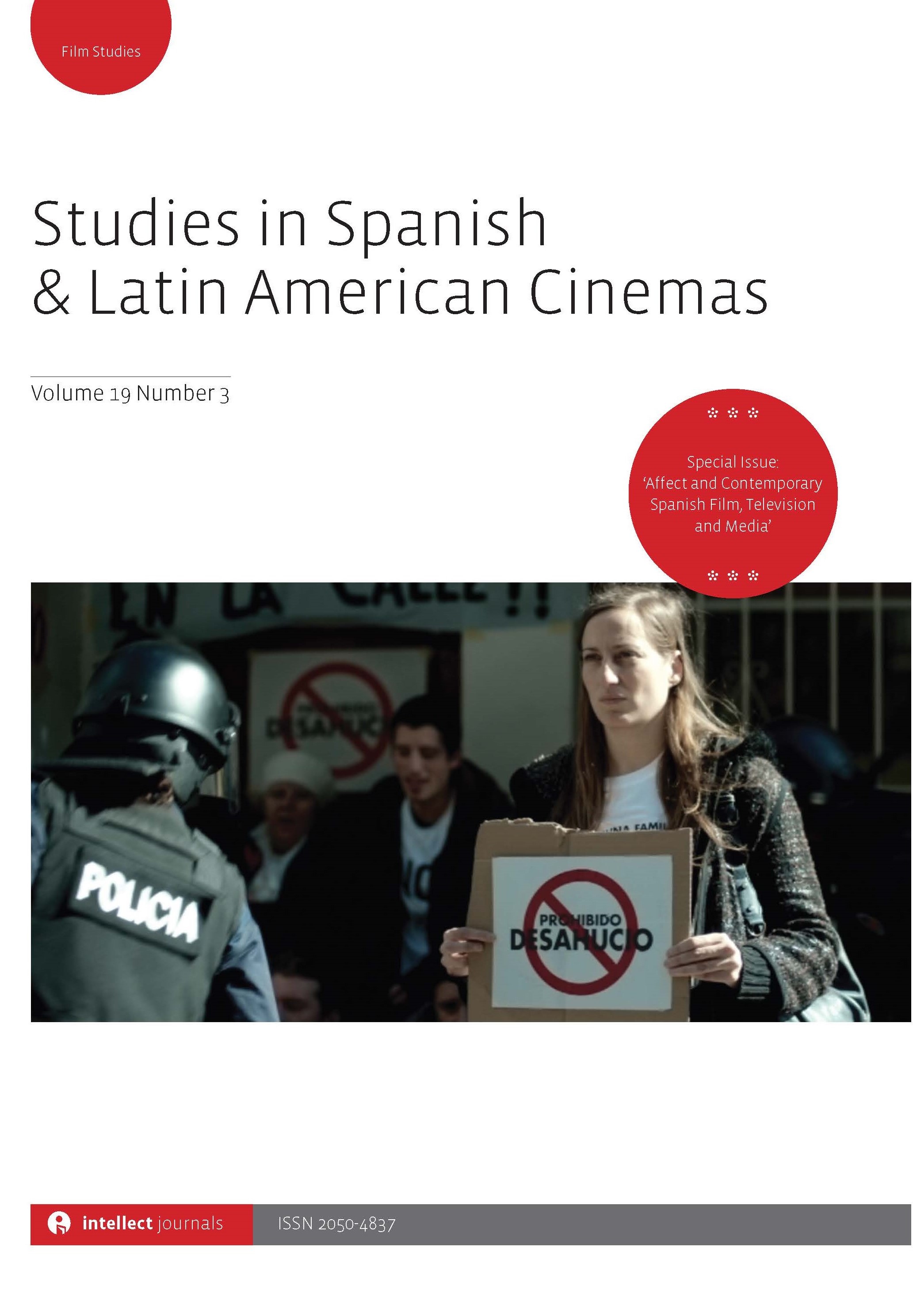- Home
- A-Z Publications
- Studies in Spanish & Latin American Cinemas
- Previous Issues
- Volume 11, Issue 1, 2014
Studies in Spanish & Latin American Cinemas - Volume 11, Issue 1, 2014
Volume 11, Issue 1, 2014
-
-
New formats, new audiences: Metrópolis (TVE2, 1985–) as a cultural TV programme in democratic Spain
More LessBy Lidia MerásAbstractMetrópolis (1985–) is a key programme in the history of Spanish television, a cultural space aimed at minorities, which responded to the new concerns of a young, urban audience after the recent transition to democracy. In the early years, Metrópolis was directed by Alejandro Gómez Lavilla at a time when video was considered to be a revolutionary kind of technology, broadening horizons in the audiovisual field and facilitating democratic dissemination of the image. Aware of the tool they had in their hands, its promoters participated in the creation of a format that used a new language, anticipating many of the creative ventures that would later be undertaken, in imitation, by other channels. Given its undeniable interest as a ‘period product’, this study examine its early development and formal innovations during the first decade of a programme that became a model in terms of cultural television broadcasting during the early years of democracy.
-
-
-
Sound and space in La hora de los hornos/The Hour of the Furnaces
More LessBy Craig EpplinAbstractThis article offers a detailed reading of the connections between sound and space in the 1968 film La hora de los hornos/The Hour of the Furnaces. Extant explorations of sound in this film tend to highlight the strategies of juxtaposition and commentary on the image track. Building on this scholarship, I propose that three uses of sound in particular – the narrative voice-over, dissonance with the image, and semi-diegetic music – correspond to the spatial imperatives of the film: its desire to forge alliances among disparate groups scattered throughout national and international space. This strategy is coherent with the express desire for the filmic experience to become a militant act, an intervention in the class war of 1960s Argentina. I conclude by positing that sonic elements together present an alternative to the vision-centric bias of critiques of late capitalism’s dawn, something The Hour of the Furnaces shares with other representative films of same period in Latin America. Finally, I suggest that the analysis of sound in this film they highlights the sensorially embedded character of all filmic experience.
-
-
-
Imagined continuities: The story of El Cid as a post-9/11 War on Terror narrative in Filmax/José Pozo’s animated feature film El Cid. La Leyenda
More LessAbstractThis article analyzes the Spanish-produced and internationally distributed animation film El Cid: The Legend (Pozo 2003) in its pedagogical and ideological dimensions as a medievalist Disney-type genre animation film within the post-9/11 global sociopolitical and media context. Pozo re-signifies the story of El Cid by merging two narratives and temporalities. On one level, the film constructs a narrative about medieval Iberia that incorporates progressive ideas about multicultural convivencia along with more traditionalist views of the Kingdom of Castile as the heroic re-civilizing agent of the Reconquista. The film also includes a Manichean narrative based on the post-Cold War media discourse-narrative of the War on Terror. In this manner, El Cid participates in a process of construction and pedagogical dissemination of a Spanish/western ideological ‘common sense’ that generates particular ways of conceiving and narrating the West’s relation with the Islamic world. This common sense combines liberal-humanist notions of multi-ethnic coexistence with neo-Orientalist imaginaries.
-
-
-
Looking amid the rubble: New Spanish documentary film and the residues of urban transformation (Joaquim Jordà and José Luis Guerín)
More LessAbstractSpanish documentary film has experienced an extraordinary flourishing during the beginning of the twenty-first century, in parallel with the increasing democratization of audiovisual means of production. In this essay I link this democratization with Spanish documentary’s tendency to become a collective social experiment that emphasizes interactions between film-makers and filmed social actors. In particular, I analyze the case of films dealing with urban transformation, because their capacity of intervening in the processes of social construction of reality is especially significant.
-
-
-
Reconfiguring gender and the representation of the Soldadera in the Mexican revolution film
More LessBy Zuzana PickAbstractIn keeping with the meticulous enterprise of rewriting women’s history in Mexico, rescuing their stories and re-inscribing their identities, undertaken in the last two decades by cultural historians, feminist writers and film scholars, this article proposes a detailed analysis of the soldadera as a protagonist in La negra Angustias (The Black Angustias, Matilde Landeta, Mexico 1949) and La soldadera (The Camp Follower, José Bolaños, Mexico 1966). Whether portrayed as a combative mulatta colonel who takes charge of her destiny or a suffering fair-skinned bride-to-be doomed to drift aimlessly, she is restored to history. Although the directors draw on existing depictions of the archetypal female of Mexican war culture and revolution, their films reveal how the identity and social reality of their characters have been shaped by discrimination and misogyny.
-
-
-
Report on Madrid de Cine-Spanish Film Screenings
More LessAbstractThis report covers the eighth edition of Madrid de Cine-Spanish Film Screenings, the major marketplace for Spanish cinema, which took place on 17–19 June 2013. Based on industry sources at the event, it offers a survey of Spanish film over the previous year and identifies five trends in current production: post-apocalyptic films, romantic dramedies, genre movies, auteurist films and titles that are innovative in their distribution and exhibition.
-
-
-
Book Reviews
More LessAuthors: María Camí-Vela, Ann Davies and Tom WhittakerAbstractThe cinema of Iciar Bollaín, Isabel Santaolalla (2012) Manchester and New York: Manchester University Press, 272 pp., ISBN 978-0-7190-8058-6 (hbk), £65
Spanish horror film, Antonio Lázaro-Reboll (2012) Edinburgh: Edinburgh University Press, 308 pp., ISBN 978 0 7486 3638 9, (hbk), £65
Alejandro Amenábar, Barry Jordan (2012) Manchester: Manchester University Press, 336 pp., ISBN 978-0-7190-7589-6 (hbk), £65
-
Most Read This Month


